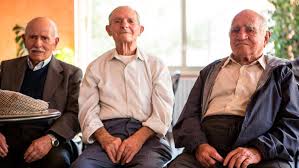Long and healthy life: Friends and family may help Italians

Rome: If you think longevity solely comes down to genes and diet, think again. Our social life — the family ties and the bonds you have with friends and community — might also play a vital role.
Adolfo Melis, who lives on the island of Sardinia, in Italy, is testament to this way of thinking.
He might be 94, but he says he feels like 50. Melis is still active — he’s one impressive pool player — he doesn’t need glasses to read the newspaper, and he gets up early enough to serve coffee from 6 a.m. onwards at his coffee shop. Importantly, “‘all my customers are my friends, and everyone knows each other,” Melis said.
So what exactly is behind Melis’ fitness at his impressive age?
Dr. Gianni Pes studied the population of this area — one of the world’s “Blue Zones,” an area with an extraordinarily long-living population — and thinks people live longer and more healthily here because they do more physical activity outdoors and feel strong connections to each other.
“The community is strong and gives support to old people,” he said. For example, there are no nursing homes in the village of Arzana in Sardinia. “Elderly people stay within the family until the end of their existence,” Pes said.
People who lack social connections have 50% higher odds of dying than others who are more connected, according to a review of 148 studies. Being isolated was also shown to have a greater effect on high blood pressure than having diabetes in old age, according to another recent study.
“There have been a couple of comparisons that social isolation has a risk of mortality that’s about the same as the other major risk factors that we think about, so smoking, for instance, is on a par with that,” said Lisa Berkman, professor of public policy, epidemiology and global and population health at the Harvard T.H. Chan School of Public Health.
One common social activity in particular is shown to help us stay healthy: enjoying a meal together. Melis himself regularly enjoys eating dinner with friends and family.
01 social connections health benefits intl
Adolfo Melis’ family is regularly joined by friends for dinner.
People who are socially connected tend to eat together, said Berkman, who is also the director of the Harvard Center for Population and Development Studies. She believes that by doing so, they tend to avoid eating the kind of foods that people under a lot of stress turn to, such as comfort food.
“What we know is that people who have strong social connections tend not to be so obese,” she added.
The most obvious reason for socializing doing us good is that social people have better health behaviors, she said. People with strong ties tend to eat better, smoke less and be slightly more physically active. In turn, people with stressful relationships tend to have some unhealthy behaviors, such as eating less healthily and smoking more. “In a number of studies, these behaviors have turned out to be important.”
The evidence on socializing being good for our health doesn’t stop there. People are also less susceptible to the common cold if they have good social relationships, according to a randomized trial.
The stress and strain of a lack of connections can generally make “you more susceptible to whatever’s out there,” as it can weaken people’s immune systems, Berkman said.
When isolated people are exposed to an infectious agent, they are more vulnerable to it, she said. This is why disconnection can make people more susceptible to infectious diseases, like the cold or tuberculosis or even the progression of AIDS.
The ‘why’ still unanswered.
Research from as far back as the 1900s shows the danger of lacking social connections. But the exact reasons for this haven’t been pinpointed.
“Probably over 40 years, people have been trying to understand why it is social relationships actually can impact health and well-being,” explained Janelle Jones, a lecturer of social psychology at Queen Mary University of London.
Feeling connected with others and having shared experiences allows people to build identity, Jones believes. This lets people access support and gain good feelings from others, and it can be a source of activity. “We know that all of those things together are actually linked to better health outcomes.”
Another possible answer to why socializing is good for our health could be in our brain. People with larger social networks were shown to have a higher pain tolerance in a 2016 trial by Katerina Johnson, a research associate at Oxford University’s Department of Experimental Psychology.
Looking at 107 people, the study showed that participants with more friends were able to endure a pain test — squatting against the wall with their legs bent at a 90-degree angle — for longer.
“It might sound a bit strange, but we actually expected to find this result,” Johnson said, “because we think this relationship is related to the activity of a chemical in the brain called endorphin.”
Endorphins are the body’s natural painkillers and are stronger than morphine. These chemicals “help to dampen any way that we kind of stress the body,” whether it’s physical or social pain, Johnson said. They have a second important role: giving people a nice buzz when around company, making us seek out social connections.
The idea behind well-connected people having a higher pain tolerance is that if they maintain social bonds, their brain adapts to have a higher endorphin activity, she explained.
Another find from Johnson’s study was that people who were more stressed tended to have smaller social networks. Socializing can reduce the body’s stress response and endorphins alleviate stress, she said.
The key message is that “our social relationships aren’t just kind of an add-on part of our life. They actually are really integral to our physical and mental well-being,” Johnson explained.
The doctor will prescribe you … a book club
Some doctors in the UK agree with this sentiment. Family doctors, or GPs, in parts of the UK have started prescribing social activities such as book clubs for patients to meet their medical and non-medical needs.
This method, called social prescribing, tackles people’s needs holistically, said Olivia Field, policy and engagement manager on loneliness and social isolation for the British Red Cross. About 1 in 5 GP visits in England is due to non-medical needs, such as loneliness, problems with unemployment or personal relationships, according to a 2015 survey carried out by the UK charity Citizens Advice.
The way social prescribing works is that GPs will identify when a patient has non-medical needs, such as needing help with finances, mobility or socializing. These patients will be connected to a social prescribing link worker, a non-medical professional who will get to know the person, get to the root of their problems, co-develop a plan with them based on their own desires and link them to what resources they need.
These link workers are important, in particular when it comes to people’s emotional needs, because chronically lonely people lose confidence, and when opportunities arise for them to connect with others, that may be a difficult task. Link workers can provide additional support, such as accompanying the person to social activities.
“We know that people are more likely to connect when they are doing something together,” and they have a shared interest or focus area in that moment in time, Field said. If you’re eating together, the focus can be partly on the food and partly on each other, making it less intense than just sitting in a room with nothing to draw focus on or distract in between conversation, she said.
“We know that loneliness can be triggered by the onset of a health condition or illness, but equally the experience of loneliness itself can exacerbate that health condition,” Field said.
Social prescribing is “massively effective,” according to Field. Around half of 9,000 people helped by British Red Cross link workers said they no longer felt lonely after an average of 12 weeks. The measurement of loneliness was done using a loneliness scale developed by the University of California, Los Angeles, a standard measure recommended by government, Field added.





